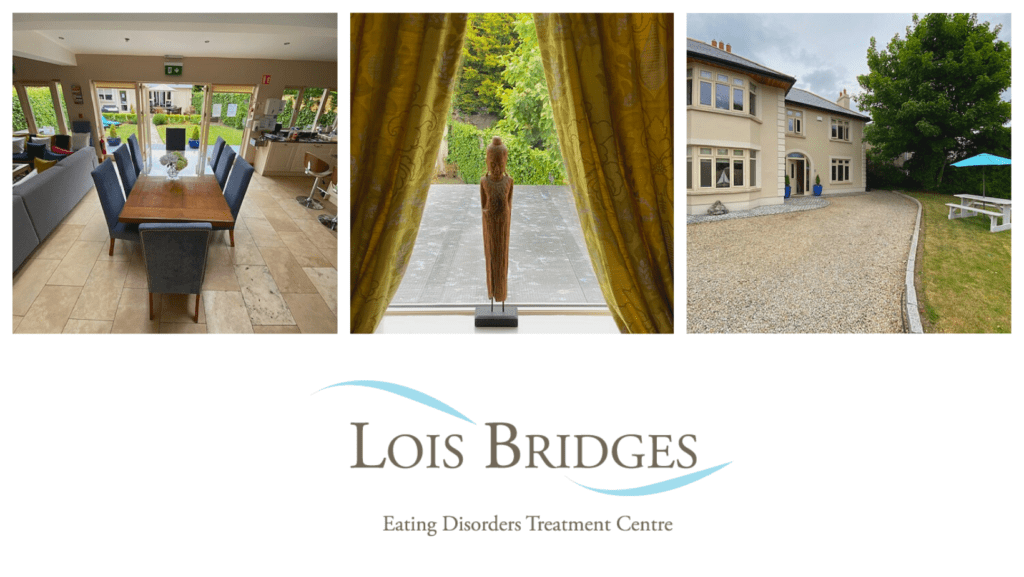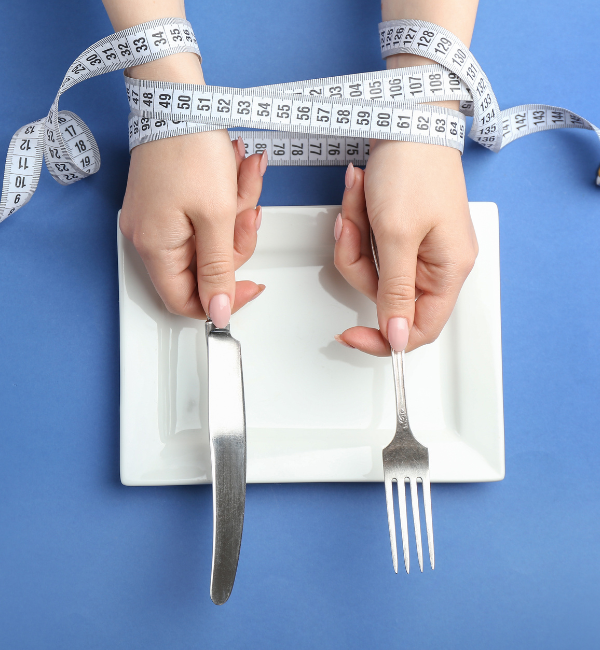TREATMENT
A HEALING COMMUNITY CREATED JUST FOR YOU
LOIS BRIDGES TREATMENT OVERVIEW
Lois Bridges is Ireland’s only dedicated Residential and Daypatient care facility solely for treatment of Anorexia, Bulimia and Binge Eating Disorders based in Dublin.

WHAT TO EXPECT
LOIS BRIDGES

TO THE CLIENT
LOIS BRIDGES

TO THE FAMILY
LOIS BRIDGES

RESIDENTIAL PROGRAMME
LOIS BRIDGES

DAY PROGRAMME
LOIS BRIDGES

OUT PATIENT AFTERCARE PROGRAM
LOIS BRIDGES

FAMILY EDUCATION PROGRAMME
LOIS BRIDGES

UNDERSTAND EATING DISORDERS
LOIS BRIDGES

FOR PROFESSIONALS
LOIS BRIDGES

FROM THE TEAM
LOIS BRIDGES

ABOUT OUR TEAM
SPECIALIST HELP AND TREATMENT FOR EATING DISORDERS IN DUBLIN
Our approach is compassionate, understanding and supportive, in a non judgmental environment. It is our mission is to embrace each individuals mental, physical, psychological and emotional aspects in order to promote recovery.At Lois Bridges we bridge the gap between each person’s Healthy self and Unhealthy self allowing clients to begin their journey of recovery. We pride ourselves on being weight inclusive and non-assumptive. We use Health at Every Size Principles.
WHAT TO EXPECT FROM LOIS BRIDGES

Care
our goal is to provide the highest quality of patient care

Experience
we offer highly experienced superior quality patient care

Professionalism
we have a team of professional experts for your care & treatment
Step by Step Guide
UNDERSTANDING WHAT WE OFFER IN LOIS BRIDGES
1. Assessment – this is when you will meet your Consultant Psychiatrist who, will have received a referral about you before they meet you. You will be able to tell them all of your concerns, issues, worries and they will talk to you about your treatment.
2. Admission – as a resident further medical and psychiatric assessments will help the team to shape your treatment. This includes a Dietetic assessment, what type of therapy is right for you, how we can support you during meals and the family support we can put in place for you.
3. Treatment – when you are admitted, the staff will support you very closely to make sure you are safe. You will work on meal plans with the dietician. Therapies will help you understand the way you feel and think; your habits and behaviours and we can teach you new skills to help you manage.
4. Discharge – from the point of admission we will be working with you to plan your discharge. The treatment at Lois Bridges is to enable you to be able to live your life after your residential stay, in a safe and sustainable way using the tools you have learnt with us.
5. Follow-up – The aftercare group program enables the client to link back into Lois Bridges for support and re-enforces the skills and tools learnt in the residential/ day program. One to one therapy including Dietetic reviews are advised in order to maintain recovery.
You will have a mixture of one to one therapy and group therapy. Some of the groups you will attend will focus on nutrition, food preparation and body image. You may also take part in social eating, so that you are better able to cope when on your own or with your family and friends after you return home.
We also provide family therapy to help you and your family understand the way you feel and think. You will eat together with the other clients and staff, in the dining room. The meals are freshly prepared on site. You will have your own meal plans prepared by our specialist dietitians.
Once you are settled you may want to have your say about what is happening and suggestions you may have. Each week there is a community meeting for clients and staff. There is also a suggestion box in the hallway if you feel more comfortable to make suggestions that way.
There is a wide choice of activities available to you as part of your treatment and agreed by your team. These include board games, movies, swimming, yoga, art, cookery, walks. For some clients there are social outings to the local cinema, shops, restaurants.
Breakfast – 8.30am
Morning Snack – 11.30am
Lunch – 1.30pm
Afternoon Snack – 3.30pm
Dinner – 5.30pm
Evening Snack – 8.30pm
Here at Lois Bridges we like to make you feel at home as much as possible, as such we encourage visits from family and significant others if you so wish. All we ask is that visiting takes place outside of group and meal times and is respectful to other clients. Children are welcome to visit their loved one and special arrangements can be made.
What can I bring with me to Lois Bridges?
Comfortable clothes, toiletries, and other personal items. We advise you to bring a small amount of money, books and a diary or two! Home comforts such as a fleecy blanket or a hot water bottle. You can bring your own towels but bed clothes- sheets, etc are provided for. You are welcome to bring your mobile phone and laptop/ tablet but please be mindful to not take pictures within open areas including of other clients or staff.
What items are prohibited?
For everyone’s safety some items cannot come into the House, these include: *Alcohol, medication (all medication including vitamins, over the counter medication, nasal sprays, inhalers, etc must be kept in the nurse’s office. *Chewing gum *Glass objects, including mirrors.
*Clothes hangers *Sharp objects, such as pins, needles or scissors, razors, tweezers, etc will be labelled and held for safe keeping in the Nurses office and can be given out as requested.
Staff you will meet
At Lois Bridges you will be allocated a Key Worker – a member of staff who will support you in your day to day treatment and who will know you best. Other staff you will meet will be the nurses who are all trained in eating disorders. There are Healthcare Assistants or HCAs, they receive specialist training at Lois Brides. You will have a Consultant Psychiatrist through your treatment. They will plan your medical treatment programme for example if you require medication. At Lois Bridges you will work with psychologists and other therapists, both in a group and by yourself. You will also work with specialist dietitians.
Guidelines
In any facility there are a few rules in place for your safety and that of others. When you arrive, we will make sure you are aware of these and why we have them in place. New places can often seem a little overwhelming but we will do everything we can here at Lois Bridges to make sure you have a positive experience of care here.
How do I make a complaint?
Lois Bridges has a Complaints Policy & Procedure and a complaint and feedback form for you to use. The Director of Services, Carla Johnston leads on the complaints process. Your complaint will be acknowledged within two days, will be dealt with as quickly as possible, and you will be fully advised of the outcome.

LOIS BRIDGES RESIDENTIAL PROGRAMME
What we offer
We pride ourselves in our treatment approach as it involves an attitude of warmth, respect empathy and honesty at all times. The focus of our team is towards gaining an understanding of each individual thus helping to enhance their motivation to accept and deal with their Eating Disorder. Our team draw upon empirically supported treatment programmes such as the Maudsley Method and we adhere to the NICE Guidelines.
Initial assessment is carried out by our Consultant Psychiatrist and Clinical Director. On Completion of assessments the team together with the individual will meet to devise and discuss their treatment plan. The length of our residential program depends upon each individual needs at the time of admission.
Our programme is designed to meet the individual needs of the client and their family and incorporates the following therapies.
- Cognitive Analytical Therapy
- Cognitive Behavioural Therapy Enhanced
- Dialectical Behavioural Therapy
- Interpersonal Therapy
- Nutritional Therapy
- Motivational Enhancement Therapy
- Expressive mind and body therapies (Art, dance, music, yoga, meditation, tai chi)
- Guided Imagery Therapy
- Family Therapy
- Group Therapy
- Art Psychotherapy
- Mindfulness
- Compassion Focused Therapy

Individual therapy
is highly valued here at Lois Bridges and a designated therapist and key worker are assigned to everyone who enters for treatment. Our Dietitian will also meet with each individual to discuss their nutritional requirements on admission. The Individual needs of each person are continually assessed by the team at our weekly multi-disciplinary team meeting.

Group sessions
take place daily and are educational and supportive in nature involving topics such as body image, food issues, weight issues, relationships, cookery and planning, recovery, pre and post meal groups, goals, assignment groups, entertainment groups, process groups, and many more. All groups are age appropriate and individual hobbies and interests are encouraged. Regular outings such as trips around Dublin, shopping, movies and eating out are all part of life at Lois Bridges.
Every aspect of our programme is designed to provide clients with a lifestyle they can continue upon discharge.
We provide a full aftercare programme that is individually designed based on each person’s needs and requirements at that time. We are committed to providing smooth transitions for every phase of recovery.
LOIS BRIDGES DAY PROGRAMME
What We Offer
Any resident can be referred to the day program or following a referral from their GP. It can also be provided as an alternative to residential care.
Clients who participate in our day program engage fully in treatment at Lois Bridges. This program runs 5 days a week. That means a person can live at home while undergoing treatment and continue to go to work or college.
People who have stopped work or college may slowly return to their job or studies during their treatment depending on their situation

Our day program runs from 10.00am- 17.00pm with the option of participating in a minimum of 3 days up to the full 5 days. Our day program offers a mix of:
- Group Therapy
- Meal Support
- Individual Therapy
- Dietetic Counselling
- Cognitive Behavioral Therapy Enhanced
- Dialectical Behavioral Therapy
- Motivational Enhancement Therapy
- Expressive mind and body therapies (Art, dance, music, yoga, meditation, tai chi)
- Guided Imagery Therapy
- Compassion Focused Therapy
Our day program includes lunch and snacks. The menu is carefully planned with our dietician to meet the needs of each individual. The staff provide help and encouragement during meals and snacks, as it acknowledged this can be a stressful time for some.
LOIS BRIDGES OUTPATIENT / AFTER CARE PROGRAMME
What We Offer
The Outpatient program is ongoing and adopts a flexible approach as we are aware that many clients have day to day commitments which they have to attend to.

Further outpatient services include:
- Group After-Care
- Individual psychotherapy (1:1)
- Dietetic sessions
- Family therapy
- Private consultations

LOIS BRIDGES FAMILY EDUCATION PROGRAM
What We Offer
This program is designed to help spouses, family members and significant others develop honest and balanced relationships with one another.
Family members learn what they can do to help, how to open up lines of communication, illuminate what role eating disorders serve within the family system, how to set boundaries and limits, and how to deal with their own feelings of guilt, anger, shame and helplessness.
UNDERSTANDING EATING DISORDERS
Eating disorders are serious, biologically influenced illnesses. If left untreated, eating disorders have a devastating impact on affected individuals and their loved ones. Full recovery from an eating disorder is possible.
Learning more about the causes of eating disorders, different types of disordered eating, and recognising the damage caused by common myths and misconceptions regarding eating disorders will help you start to understand what’s going on with your loved one and put you in a position to help them recover.

Many people believe eating disorders are simply a case of a diet taken too far. It is now known that although cultural and environmental factors have an impact, genetics play a significant role. Studies have shown that 50-80% of the risk for developing an eating disorder comes from genetics.
Specialists now recognise that in vulnerable individuals an eating disorder is usually triggered by a period of the body receiving inadequate nutrition. This nutritional deficit may be deliberate, or unintentional – for example dieting, illness, certain medications, sports training as well as trauma can be enough to trigger a disorder in a person with a genetic predisposition.
Most people can restrict their diet for a time without risk, but for those predisposed, a period of restriction can trigger physiological, neurobiological and emotional alterations that cascade into a life-threatening eating disorder.
The high value that our society places on appearance, the vilification of weight, and admiration of extreme thinness has resulted in dieting being a normalised behavior. For vulnerable individuals dieting is the “gateway drug” to an eating disorder.
Currently, eating and feeding disorders specified in the DSM include:
- Anorexia Nervosa
- Bulimia Nervosa
- Binge Eating Disorder
- Pica
- Rumination Disorder
- Avoidant/Restrictive Food Intake Disorder (ARFID)
- Other specified Feeding or Eating Disorder (OSFED)
- Unspecified Feeding or Eating Disorder (UFED)

Anorexia
If you think you or a loved one may have anorexia, look out for these warning signs:
- Skipping meals or refusing to eat
- Being secretive around food
- Cutting out all ‘unhealthy’ foods or eating a limited number of foods
- Making excuses for not eating and denying hunger
- Rigid rituals around food, such as cutting food into tiny pieces
- Weighing and measuring food
- Drinking a lot of water or chewing gum constantly
- Cooking for others but refusing to eat
- Frequently weighing and checking themselves in the mirror
- Excessive exercise
- Purging or vomiting
- Wearing baggy or layered clothing
- Frequent complaints about feeling fat, full, or bloated
- Constant preoccupation with food
- Distorted perception – a wide gap between self-image and actual appearance
- Difficulty concentrating, restlessness or hyperactivity, forgetfulness
- Poor judgement
- Denial or refusing to acknowledge the severity of the problem
- Obsessive compulsive behavior
- Depression – loss of interest in friends and activities, lack of spontaneity, lack of initiative, flattened emotional responses,
- irritability, insomnia, and diminished interest in sex.
- Changes in personality or mood swings
- Unusually thin appearance (not always dramatic or noticeable)
- Absence of periods in girls and women
- Fatigue, dizziness or fainting
- Brittle nails, hair thinning, breaking or falling out
- Soft, downy hair covering the body
- Constipation and abdominal pain, bloating
- Dry skin
- Feeling cold all the time
- Abnormal blood count
- Irregular heart rhythms, low pulse
- Low blood pressure
- Dehydration
- Loss of bone mass
The first step is visiting your GP and asking for a referral to Lois Bridges Eating Disorders Treatment Centre.

Bulimia Nervosa
If you think you or a loved one may have Bulimia Nervosa, look out for these warning signs.
- Excessive desire for privacy in the bathroom or bedroom
- Unexpected absences (walks or drives)
- Evidence of laxative or diuretic use
- Skipping meals or avoiding eating with others
- Sudden dietary changes
- Obsessive eating – cutting food into very small pieces, chewing excessively, separating different types of food on plate
- Eating unusually large amounts of food without gaining weight
- Food disappearing, large numbers of empty food wrappers or containers in the rubbish
- Hiding or hoarding food
- Shoplifting or spending large amounts on food
- Excessive or rigid exercise regimes
- Going to the bathroom after meals
- Use of mints or gum to cover the smell of vomit
- Running water to cover the sound of vomiting
- Wearing baggy or layered clothing
- Preoccupation with body weight and dieting
- Anxiety and depression
- Low self-esteem, shame and guilt
- Isolation and loneliness
- Emotional behaviour and mood swings
- Frequent changes to weight
- Sore throat, tooth decay and bad breath
- Rounder face caused by swollen salivary glands
- Poor skin
- Irregular periods
- Lethargy and tiredness
- Swollen or red marks on the fingers or knuckles that may be used to stimulate the gag reflex
The first step is visiting your GP and asking for a referral to Lois Bridges Eating Disorders Treatment Centre.

Binge Eating Disorder
BED is characterised by recurrent episodes of binging, or extreme overeating.
Binging occurs when a person eats a large amount of food in a short amount of time, and is usually marked by a lack of control.
On average, Binge Eating Disorder is diagnosed when a person has an episode at least once a week for at least three months.
People with binge eating disorder may eat very quickly, even if they’re not hungry. They often feel guilt and embarrassment about their eating, which leads to binging alone to hide the behaviour.
The first step is visiting your GP and asking for a referral to Lois Bridges Eating Disorders Treatment Centre.

Avoidant / Restrictive food intake disorder
- Trouble eating or digesting specific types of food
- Only eating very small portions
- Eating very slowly
- Avoiding particular types, textures, or colours of food
- Lack of appetite
- Fear of eating – can be caused as a result of choking or vomiting previously
The first step is visiting your GP and asking for a referral to Lois Bridges Eating Disorders Treatment Centre.
Eating disorders don’t always fall into neat categories. People with disorders that don’t meet the criteria for a specific disorder may be diagnosed as Other Specified Feeding or Eating Disorder (OSFED) or Unspecified Feeding or Eating Disorder (UFED).
If a person is diagnosed with OSFED, they have an eating issues which don’t quite fit the criteria for any one disorder. It doesn’t mean they don’t have a problem. For example, they may meet the criteria for anorexia nervosa but continue to menstruate, regularly purge without binge eating, or binge eat very infrequently.
UFED, on the other hand, is usually used when a patient clearly suffers from disordered eating patterns, but medical professionals don’t have all the information they need to make a diagnosis.
Although Orthorexia hasn’t been classified by DSM-V, it is recognised as an issue with links to eating disorders. Orthorexia is described as an extreme obsession with eating healthy food and avoiding “unhealthy” food. Sufferers may restrict their eating more and more as the disorder progresses. Left untreated, or combined with other risk factors, Orthorexia can progress into a full-blown eating disorder.
It’s important to remember that eating disorders are serious, whether anorexia, bulimia, binge eating disorder, or any of the other categories. All eating disorders have physical and psychological risks, and they can all be very dangerous if left untreated.
The first step is visiting your GP and asking for a referral to Lois Bridges Eating Disorders Treatment Centre.
All journeys must begin with a single step – Call us on (01) 839 6147
TESTIMONIALS
frequently asked questions
Contact Us
Whether you are a client, family member or professional – do not hesitate to contact Lios Bridges


